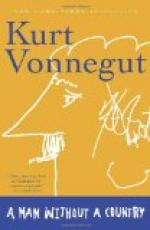But, as I say, there is no need for secrecy any longer. And now the poor creature is dead, it seems to me worth while to tell a little of his story, by way of showing young Americans of to-day what it is to be A man without A country.
Philip Nolan was as fine a young officer as there was in the “Legion of the West,” as the Western division of our army was then called. When Aaron Burr [Note 5] made his first dashing expedition down to New Orleans in 1805, at Fort Massac, or somewhere above on the river, he met, as the Devil would have it, this gay, dashing, bright young fellow; at some dinner-party, I think. Burr marked him, talked to him, walked with him, took him a day or two’s voyage in his flat-boat, and, in short, fascinated him. For the next year, barrack-life was very tame to poor Nolan. He occasionally availed himself of the permission the great man had given him to write to him. Long, high-worded, stilted letters the poor boy wrote and rewrote and copied. But never a line did he have in reply from the gay deceiver. The other boys in the garrison sneered at him, because he lost the fun which they found in shooting or rowing while he was working away on these grand letters to his grand friend. They could not understand why Nolan kept by himself while they were playing high-low jack. Poker was not yet invented. But before long the young fellow had his revenge. For this time His Excellency, Honorable Aaron Burr, appeared again under a very different aspect. There were rumors that he had an army behind him and everybody supposed that he had an empire before him. At that time the youngsters all envied him. Burr had not been talking twenty minutes with the commander before he asked him to send for Lieutenant Nolan. Then after a little talk he asked Nolan if he could show him something of the great river and the plans for the new post. He asked Nolan to take him out in his skiff to show him a canebrake or a cotton-wood tree, as he said,—really to seduce him; and by the time the sail was over, Nolan was enlisted body and soul. From that time, though he did not yet know it, he lived as A man without A country.




